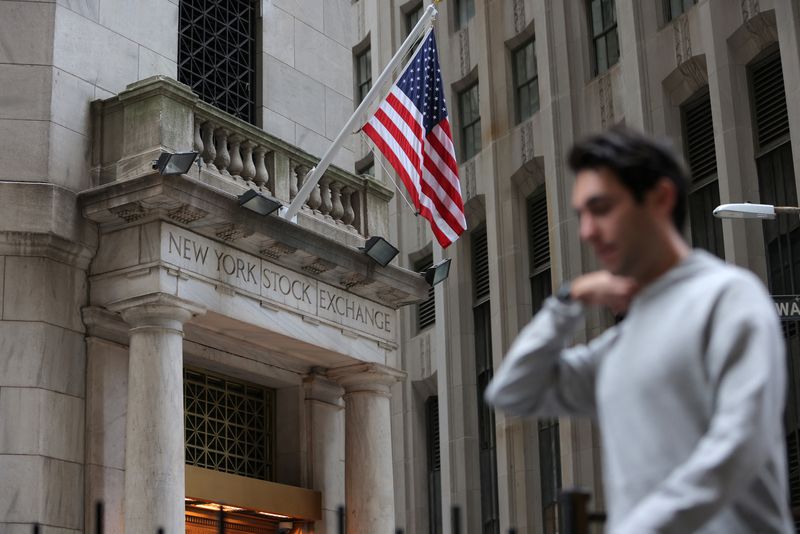Investing.com -- US stock futures stick close to the flatline on Monday, as markets await comments from Fed chair Jerome Powell and the latest nonfarm payrolls report later in the week. Elsewhere, California governor Gavin Newsom vetoes a highly-contested bill that would have introduced new regulations on artificial intelligence companies in the state.
1. Futures muted
US stock futures hovered around the flatline, with investors looking ahead to a speech from Powell on Monday and the fresh jobs market data (more below).
By 03:30 ET (07:30 GMT), the Dow futures contract had shed 30 points or 0.1%, while S&P 500 futures and Nasdaq 100 futures were unchanged.
The 30-stock Dow Jones Industrial Average ended the prior session at a new record high. Fueling sentiment was a Commerce Department report that suggested a waning in inflationary pressures and a muted uptick in consumer spending.
The figures bolstered bets that the Fed may roll out another outsized 50-basis point interest rate cut at its next gathering, according to the CME Group's (NASDAQ:CME) FedWatch Tool. The central bank, prompted by indications of easing price pressures and weakening in labor demand, slashed borrowing costs by 50 basis points earlier this month.
Traders are now turning their attention to comments on the outlook for the economy from the Fed's Powell at the National Association for Business Economics annual meeting in Tennessee at 13:55 ET.
2. Jobs market report ahead this week
Highlighting the economic calendar this week will be the latest US nonfarm payrolls report, which may offer a glimpse into the health of the labor market.
Economists expect the US economy to add 144,000 jobs in September, up slightly from 142,000 in the prior month. The unemployment rate, meanwhile, is seen matching August's level of 4.2%.
In August, payrolls rose from a downwardly revised reading of 89,000 and were below forecasts of 164,000, while the jobless rate ticked down from 4.3%. As a whole, the numbers indicated a downshift in labor demand -- a trend identified by several Fed officials as a key driving force behind their decision to announce a jumbo rate reduction.
Analysts at ING argued in a note to clients that the jobs market continues to hold "the key to the pace" of upcoming potential interest rate cuts, particularly as inflation -- once the major focus of a series of aggressive Fed borrowing cost hikes -- shows signs of abating.
"If we get the unemployment rate rising back to 4.3% next Friday and a sub 75,000 payrolls print expect the calls for a second 50 [basis point] rate cut to grow markedly," the ING analysts said.
3. CA governor vetoes controversial AI bill
California governor Gavin Newsom has vetoed a bill that aimed to place fresh regulations on artificial intelligence, arguing that the measure could stifle innovation.
The bill would have set strict guidelines around those creating AI tools, including mandates for safety testing for advanced AI models that cost more than $100 million to develop. It would have also made AI software developers create a mechanism to turn off AI models, amounting effectively to a kill switch.
Democratic State Senator Scott Wiener, the bill's sponsor, had said it would help to protect the public from AI before the technology becomes too unwieldy.
However, big-name tech groups, including Instagram-owner Meta Platforms (NASDAQ:META) and ChatGPT-maker OpenAI, voiced their opposition to it, warning that the proposed rules would hinder both AI's development and California's role as a destination for crafting the nascent technology.
In a letter to the state's senate, Newsom flagged that 32 of world's most important AI firms are based in California, adding that the new framework would "curtail the very innovation that fuels advancement in favor of the public good."
4. Chinese manufacturing activity dips in September
Chinese factory activity contracted in September, although it was just above economists' forecasts, in a sign of the challenges facing lawmakers in Beijing as they attempt to reinvigorate the world's second-largest economy.
The official manufacturing purchasing managers' index (PMI) came in at 49.8 during the month, rising from 49.1 in August and topping expectations of 49.4. A mark below 50 indicates contraction.
The Caixin manufacturing PMI was 49.3, slipping from 50.4 in August and below projections of 50.5.
Meanwhile, the official non-manufacturing PMI read 50 and the Caixin services PMI index was 50.3, dropping from a prior level of 51.6.
Last week, China unveiled a raft of new stimulus measures as lawmakers push to deliver on a target of 5% annual growth.
"While the official PMIs held up okay in September, the Caixin PMIs dropped quite sharply which suggests that the economy lost some momentum this month. The stimulus package announced last week thus comes at a much needed time, and should provide some near-term support to activity," analysts at Capital Economics said in a note to clients.
5. Crude rises amid Middle East tensions
Oil prices rose Monday on the possibility of a widening Middle East conflict after Israel stepped up its attacks on the Iranian-backed Hezbollah and Houthi militant groups.
By 03:30 ET, the Brent contract climbed 0.9% to $72.20 per barrel, while U.S. crude futures (WTI) traded 0.8% higher at $68.71 a barrel.
Israel said it bombed Houthi targets in Yemen on Sunday, just a few days after killing Hezbollah leader Sayyed Hassan Nasrallah in an escalating conflict in Lebanon.
Both contracts fell last week as demand worries increased after fiscal stimulus from China, the world's top oil importer, failed to reassure market confidence.
